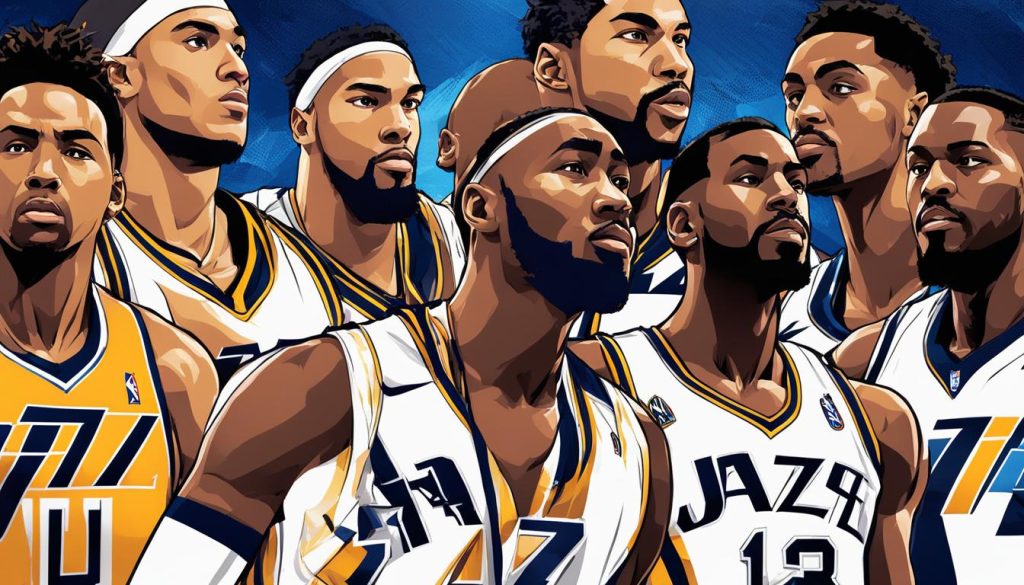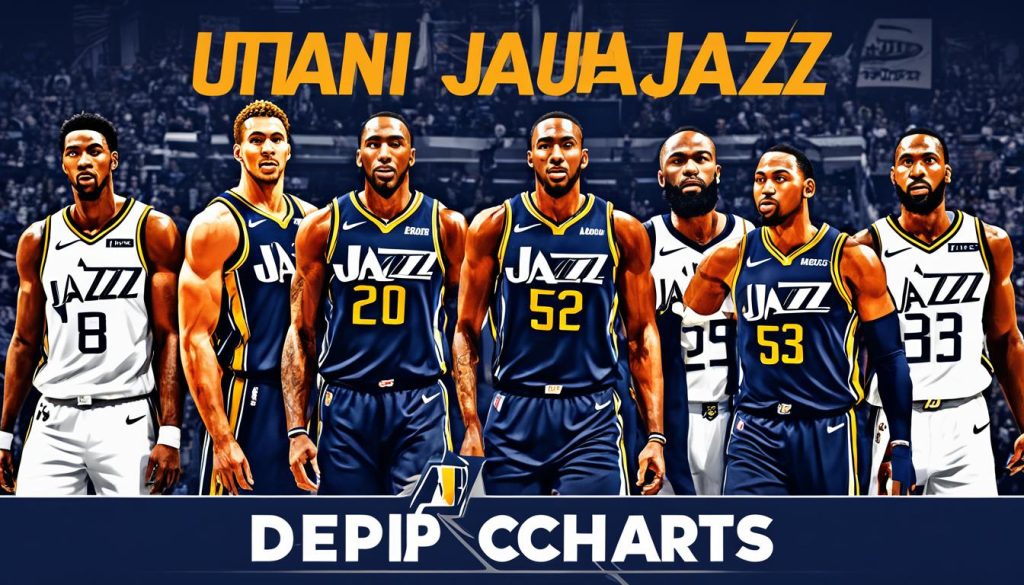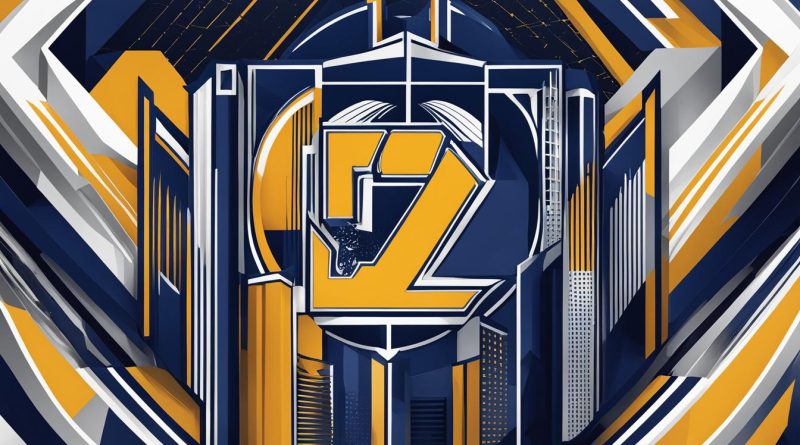Utah Jazz Depth Chart Analysis & Roster Insights
The Utah Jazz’s current depth chart is a topic of great interest among fans and enthusiasts alike. The team’s roster composition and organization play a crucial role in determining their performance and success in the upcoming season. By analyzing the Utah Jazz’s depth chart, we can gain valuable insights into the strengths and weaknesses of the team and their future prospects. This article aims to provide a comprehensive depth chart analysis and roster insights that will give fans a deeper understanding of the team’s dynamics.
Key Takeaways
- The Utah Jazz’s depth chart analysis provides valuable insights that can help fans better understand the team’s dynamics.
- The structure and organization of the roster determines the team’s performance and success in the upcoming season.
- Examining the key players and rotations is essential in determining the team’s prospects.
- Strengths and weaknesses analysis of the roster can help assess the team’s performance.
- Regular updates on the depth chart can help fans stay abreast of changes in the team’s dynamics.
Understanding the Utah Jazz Depth Chart
The Utah Jazz’s depth chart is a roster management tool that outlines the team’s positions and player rankings. It’s an essential resource for coaches and players, helping them determine which players to use on the court in different situations.
The depth chart is divided into five positions: point guard, shooting guard, small forward, power forward, and center. Each position has a starter and a backup player, with occasional exceptions for third-string players or development league call-ups.
There are several factors to consider when constructing a depth chart, including skill, experience, age, potential, and chemistry with teammates. The depth chart can change throughout the season due to injuries, trades, or changes in performance, making it a dynamic and ever-evolving aspect of the team’s strategy.
When analyzing the Utah Jazz’s depth chart, it’s crucial to consider the team’s overall strategy and game plan. The depth chart is not merely a list of players ranked by skill; it’s a tool for optimizing the team’s performance by deploying players in a way that complements each other’s skills and maximizes efficiency.
| Position | Starter | Backup |
|---|---|---|
| Point Guard | Mike Conley Jr. | Jordan Clarkson |
| Shooting Guard | Donovan Mitchell | Miye Oni |
| Small Forward | Bojan Bogdanovic | Joe Ingles |
| Power Forward | Royce O’Neale | Georges Niang |
| Center | Rudy Gobert | Derrick Favors |
The Utah Jazz’s depth chart shows a balance of seasoned veterans and rising stars, with a mix of offensive and defensive capabilities. It’s clear that the team’s coaches take a measured approach with a clear vision in mind, ensuring that they deploy the right players at the right time to maximize their chances of success.
Key Players and Rotations
The Utah Jazz’s key players play a vital role in the team’s success, both in the starting lineup and off the bench. Here’s a closer look at some of the standout players and rotations:
| Position | Player | Highlight |
|---|---|---|
| Point Guard | Mike Conley | Consistently solid performances and solid ball-handling skills |
| Shooting Guard | Donovan Mitchell | Excels in scoring and playmaking, has excellent court vision, and a great attitude and leadership skills |
| Small Forward | Bojan Bogdanovic | Known for his shooting abilities, boasts great conditioning and defensive skills |
| Power Forward | Royce O’Neale | An all-around player with excellent offensive and defensive attributes, rebounds well and a solid general defender |
| Center | Rudy Gobert | One of the league’s best rim protectors, top-tier rebounder, efficient scorer |
The player rotations in the Utah Jazz line up reflect an approach to share minutes among all key players, without any craving or grudges for individual playing time. Head coach Quin Snyder has shown a preference for timely substitutions, keeping everyone fresh over the course of the game. This has been a formula for their sustained success, and their incredible unity as a team. This is evident in the bench’s many solid performances, featuring Jordan Clarkson, Joe Ingles, and Derrick Favors.

Utah Jazz’s key players gather around head coach Quin Snyder for a strategy huddle.
Utah Jazz Depth Chart Insights and Future Prospects
After a thorough analysis of the Utah Jazz’s depth chart, several insights can be gleaned regarding the team’s strengths and weaknesses. At the point guard position, it is evident that Donovan Mitchell is the clear starter, with Mike Conley providing valuable backup. In addition, Joe Ingles has been instrumental in the team’s success as a small forward.
However, the team’s lack of depth at the center position is a cause for concern. Although Rudy Gobert is an elite player, his backup, Udoka Azubuike, is inexperienced, and this could potentially hurt the team’s performance. Additionally, the team’s inconsistency in shooting and perimeter defense should not be ignored.
As for the future prospects of the team, the Utah Jazz has a talented core of players that can propel them to success in the coming seasons. Donovan Mitchell, at the age of 25, is a rising star who may reach new heights in his career. Furthermore, the team has some promising young players, such as Trent Forrest and Elijah Hughes, who could be vital in the team’s quest for a championship.
Finally, the Utah Jazz’s depth chart could be affected by any notable adjustments or changes that may occur as the season progresses. Thus, it is imperative for the team to remain vigilant and adaptable to ensure success.

Conclusion
The Utah Jazz’s depth chart analysis and roster insights have provided fans and enthusiasts with a comprehensive understanding of the team’s current dynamics. By exploring the team’s structure and organization, key players, rotations, and future prospects, this article has shed light on the strengths and weaknesses of the roster.
With this knowledge, fans will be able to follow the team’s progress with greater depth and insight into how the players contribute to the team’s performance. The Utah Jazz’s depth chart may change over the course of the season due to injuries, trades, or other factors, but by understanding the team’s current roster, fans will be better equipped to follow any changes and shifts in player dynamics.
Overall, this article has provided valuable analysis and insights into the Utah Jazz’s depth chart, and the team’s future prospects, and has allowed fans to gain a deeper appreciation and understanding of the team and its players. With this knowledge, fans can look forward to a thrilling season of basketball and can continue to support the Utah Jazz with confidence.
FAQ
What is a depth chart?
A depth chart is a graphical representation of a sports team’s roster, which indicates the order of players at each position and their relative playing time.
How is the Utah Jazz’s depth chart structured?
The Utah Jazz’s depth chart is organized by positions, such as point guard, shooting guard, small forward, power forward, and center. Each position lists the players in order of their importance and playing time.
Who are the key players in the Utah Jazz’s roster?
The key players in the Utah Jazz’s roster include Rudy Gobert, Donovan Mitchell, Mike Conley, Bojan Bogdanovic, and Joe Ingles. These players have consistently made significant contributions to the team.
How are the rotations determined for the Utah Jazz?
The rotations for the Utah Jazz are determined by the coaching staff based on factors such as a player’s skill level, performance in practice and games, and their role in the team’s game plan.
What are the strengths and weaknesses of the Utah Jazz’s roster?
The Utah Jazz’s roster is known for its strong defense, especially with the presence of Rudy Gobert, who is a two-time Defensive Player of the Year. However, some weaknesses include a lack of consistent scoring options beyond Donovan Mitchell and the need for more reliable bench production.
Are there any notable changes or adjustments expected in the Utah Jazz’s depth chart?
As the season progresses, there might be adjustments in the Utah Jazz’s depth chart due to injuries, player performance, or strategic decisions made by the coaching staff. These changes are common in professional sports teams.
